Technology has transformed the way you can tap into the insights embedded in your DNA. From understanding genealogy and health risk factors to slowing down aging — genetic data can help you improve your quality of life.
DNA testing services like 23andMe and Ancestry, or more specifically AncestryDNA, have naturally tickled the fancy of millions worldwide. Both offer direct-to-customer (DTC) tests that can reveal some information about your ancestry, genetic traits, and health.
AncestryDNA vs. 23andMe at a Glance
Both AncestryDNA and 23andMe use custom genotyping technology and proprietary algorithms to interpret your genetic codes. As a result, the type of information they identify and the reports they provide tend to vary.
To establish a baseline for comparing AncestryDNA and 23andMe, we’ll first outline their core services. Refer to the table below for a snapshot before you dive into platform-specific details:
AncestryDNA: Genealogical DNA Testing
AncestryDNA mainly provides insights into your genetic ethnicity and ancestral roots. The service relies on testing autosomal chromosomes, which you inherit equally from both your parents, to outline your family history and lineage. The tracking can potentially go as far back as 1,000 years, though the effective range for most users is 200–300 years or 6–8 generations.
AncestryDNA gives you access to multiple genealogy services once you order its DNA kit, notably:
DNA matches: Lead you to profiles (within AncestryDNA’s database) that may share the same ancestry as you
Family tree maker: Gives you the option to set up your family tree, as well as find and add new members to it
Ethnicity estimates: Map out all the regions your ancestors may have hailed from using ethnicity algorithms and prediction models
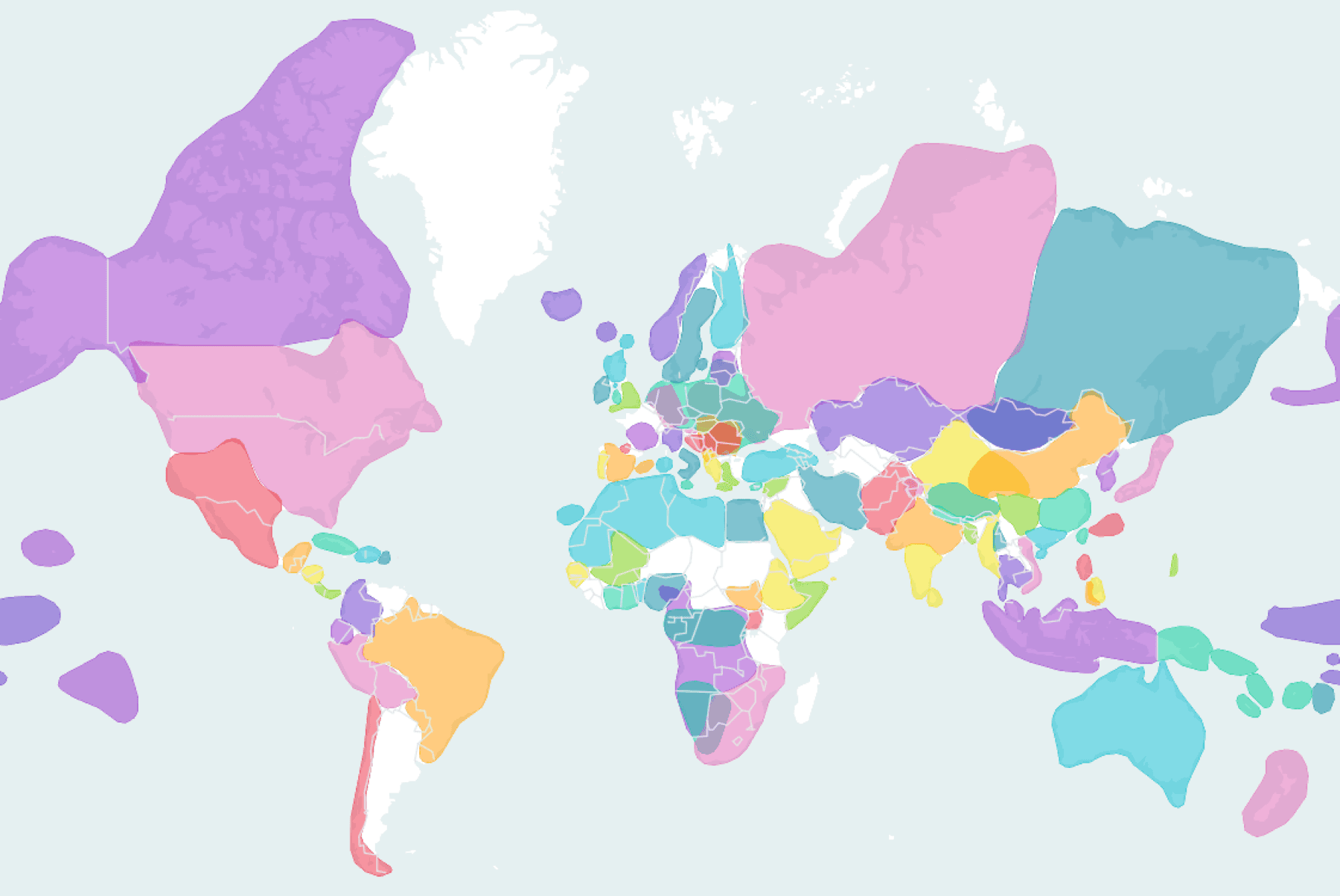
Source: Ancestry.com
The tier of membership you opt for determines the breadth of services you can access. For instance, World Explorer and All Access memberships unlock some of your genetic traits that may impact your appearance or natural fitness levels.
Note: The platform introduced the AncestryHealth product in 2019 with the aim to pinpoint potential health risks triggered by gene variants, but the service was discontinued in 2021.
23andMe: Genealogical and Health-Based Testing
23andMe, compared to AncestryDNA, has a similar DTC genetic testing and ancestry reporting service. The platform’s base plan offers detailed insights into ancestry composition and genetic traits. The bonus is that its advanced subscriptions give you access to several health-focused reports.
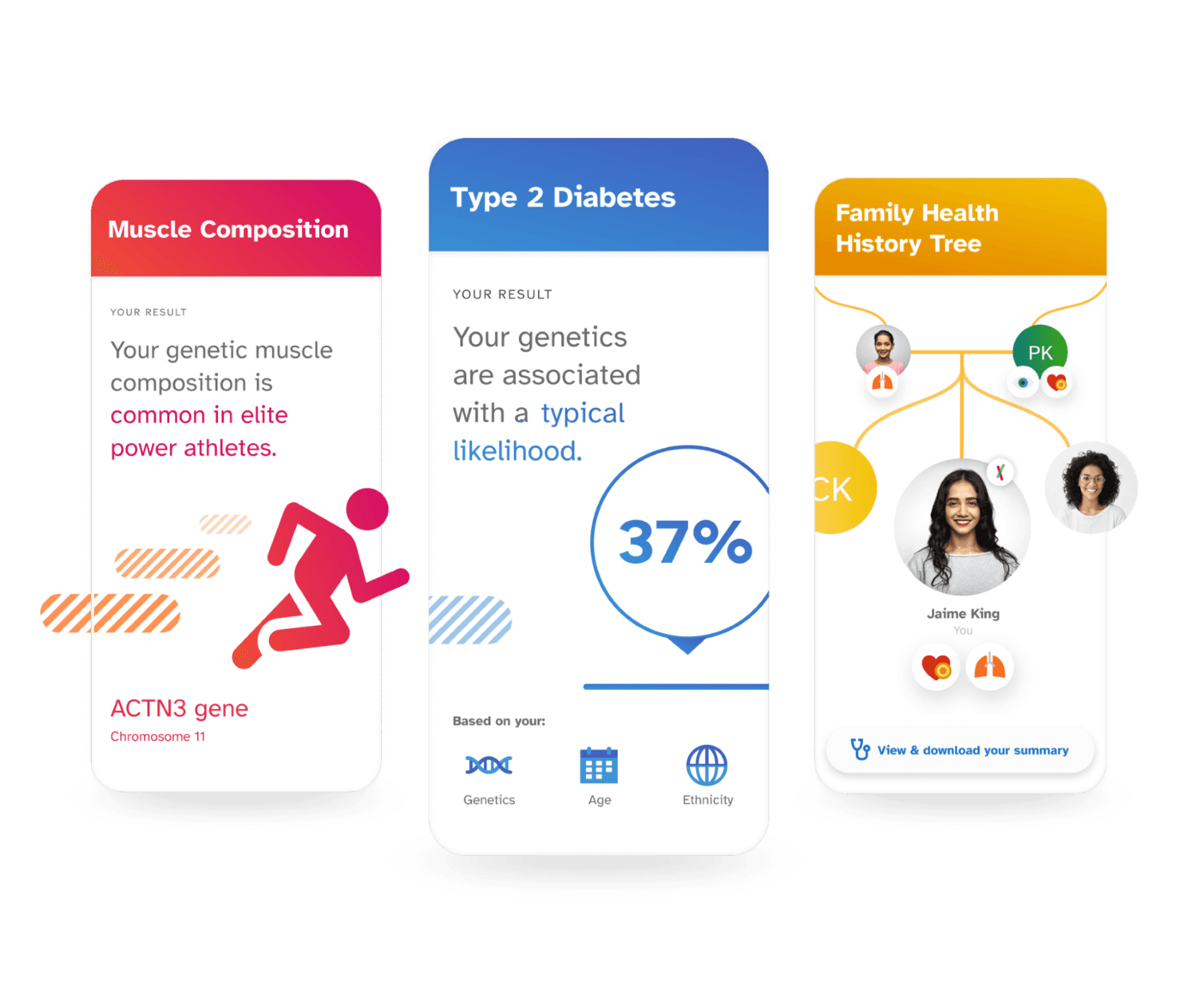
Source: 23andMe
Similar to AncestryDNA, 23andMe uses autosomal DNA to provide information about your ancestry, typically up to eight generations. You can also access reports about detected genetic traits, such as those that predispose early hair loss or sensitivity in specific taste receptors. Trait reports are available on the base plan, unlike AncestryDNA, which offers them only on higher-tier subscriptions.
When it comes to health analysis, you can find 150+ reports under the following unique categories:
Wellness reports: Offer insights into the connection between your genetics and wellness subtopics like lactose intolerance and seasonal allergies
Genetic health predisposition reports: Inform the likelihood of you developing health conditions like ADHD and Lupus
Carrier status reports: Reveal if you carry the DNA variant for certain inherited genetic conditions
An Extensive Comparison of AncestryDNA and 23andMe
While looking at the breadth of features alone, it’s easy to assume 23andMe is the better service of the two — but the conclusion is not that cut-and-dry. You’ll have to first consider your primary needs behind opting for a DNA test, as well as factors in service differentiators like ease of use and privacy.
Go through the following eight sections to get a nuanced AncestryDNA vs. 23andMe comparison:
Geographic subgrouping and database size
Depth of ancestry reports
Quality of health insights
Pricing considerations
Using the DNA test kits
Privacy and security
Accessibility
User opinion
1. Geographic Subgrouping and Database Size
If you’re analyzing AncestryDNA vs. 23andMe for accuracy in ancestry results, you’ll have to evaluate both services’ geographic reference populations and their existing user database. These factors give more character to your report, especially if you’re hunting for family trees or expecting more reliable ethnicity estimates.
Here’s how both services fare in terms of data repositories:
AncestryDNA might have a slight advantage because of its massive database and abundance of family trees. That said, some users consider 23andMe’s ancestry reports to be more detailed in terms of geographic data.
2. Depth of Ancestry Reports
Both services offer a detailed breakdown of the potential regions your ancestors were from, alongside a percentage score for each ethnicity. That said, those scores tend to vary for both services due to factors like:
The differences in their databases
Their unique grouping systems for various ethnicities
Example: let’s say an AncestryDNA report finds your ethnicity estimate as 60% from Great Britain, but 23andMe may classify you as 70% British and Irish.
A major differentiator that works in 23andMe’s favor is the reporting for maternal and paternal haplogroups — essentially, the migration pattern of your ancestors. This is because the platform conducts additional yDNA or mitochondrial DNA (mtDNA) genotyping tests that help track your roots.
While AncestryDNA reports do not cover haplogroup data, you can use the platform to access historical records like birth certificates and home addresses of certain ancestors (if available in its database).
3. Quality of Health Insights
Since AncestryDNA keeps its services limited to genealogy, 23andMe might seem like the best DNA testing kit for health. While it does offer genetic health screening, there’s still a catch. 23andMe’s health reports are incomplete due to the inherent drawbacks of the genotyping technology used for most direct-to-consumer DNA tests.
Genotyping involves reading only specific locations in your genome — which refers to all your DNA. So, you never get a complete picture of how your health is shaped by your genome.
According to a report featured in Harvard Health Publishing, DTC DNA tests, provided by commercial organizations like 23andMe, offer limited knowledge of the most important DNA variants — or genetic differences among people.
Overall, you can consider 23andMe’s health services as long as you’re aware of the blindspots in genotyping. If you need comprehensive health insights, it’s best to opt for genetic tests that:
Are physician-approved
Employ whole-genome sequencing (WGS) to analyze ALL your DNA
Tip: If you want the precision of physician-ordered DNA tests in the comfort of your home, try Nucleus’ all-in-one DNA health test offered in partnership with doctors at SteadyMD. It leverages WGS technology to give you thorough disease risk insights with accuracy unmatched by any DTC testing service on the market.
4. Pricing Considerations
AncestryDNA and 23andMe offer their DNA testing services at base price points of $99 and $119, respectively. While AncestryDNA’s premium memberships can cost up to $479 annually, your effective cost may go up depending on the add-on reports and features you wish to access.
23andMe typically offers single-price points across membership tiers, but you have to shell out $999 for the most comprehensive subscription.
5. Using the DNA Test Kits
Both AncestryDNA and 23andMe offer a convenient and somewhat similar process for collecting your DNA. You need to:
Order your kit
Register it online when you receive it
Follow the in-kit instructions to provide your saliva sample
Mail the kit back as instructed for processing
While 23andMe conducts its genetic testing in CLIA-certified labs, we could not verify the same for AncestryDNA.
It’s worth noting that AncestryDNA typically takes 6–8 weeks to process your saliva sample and generate your results, while it’s 4–6 weeks for 23andMe. In general, you can expect longer wait times during the holiday season.
6. Privacy and Security
Both AncestryDNA and 23andMe follow the industry-standard regulations to protect your privacy and keep your data safe. Your information is not shared with third parties unless it’s legally required or the service has your explicit consent. You also retain full ownership over your DNA data.
It’s worth pointing out that while AncestryDNA destroys your biological samples only upon request, 23andMe asks for biobanking permission to keep and analyze your biological specimens. If you don’t consent, your sample will be discarded after processing. Still, you can revoke your consent at any point, which won’t prevent you from receiving the results.
7. Accessibility
AncestryDNA currently ships to 122 countries across Africa, Americas, Asia, Europe, and Oceania. 23andMe offers its services in the U.S., U.K., and Canada, and about 40 other countries around the world.
8. User Opinion
The general opinion on both services can be quite divided — if you look at Reddit, most AncestryDNA vs. 23andMe discussions center around why the services offer such different ethnicity estimates. Here’s what one user had to say:
“Ancestry has my family’s African American communities down to a T, but has some weird quirks like giving me more Scotland than both of my parents combined and giving my mom 10% Sweden and Denmark when it’s clearly misread Northern English or something.
23andMe I think has a more accurate estimate (and haplogroups, which Ancestry doesn’t give at all) but gives me 3 regions for England and none for any African ethnic group, which I think is odd.”
User opinions can be subjective when it comes to accuracy, though. Many customers find AncestryDNA’s ethnicity and genetic communities to be more accurate, while some users think 23andMe’s geographical subgrouping is more realistic.
A common opinion about 23andMe is that its haplogroup data is interesting and may appeal to those driven by curiosity. On the other hand, its health-related insights can be unreliable and should be treated as informational and not diagnostic.
Takeaway: What Is the Best DNA Testing Kit?
If you have ancestry curiosities on the top of your mind, any of the two services would work. You may want to consider 23andMe for its added haplogroup insights or AncestryDNA in case you prioritize finding DNA matches and building your family tree.
That said, if you want to go beyond a superficial analysis and improve your health and longevity with reliable genetic insights, neither of these options is ideal.
To get a complete analysis of your health risk factors and personal traits based on all your gene variants — choose Nucleus. It offers a clinical-grade, at-home DNA testing kit for whole-genome sequencing.
Unlike genotyping-based DTC services like AncestryDNA and 23andMe, which consider only about 700,000 DNA bases, Nucleus analyzes around 6 billion data points. You access ALL insights hidden in your DNA — whether to see the future of your individual health, uncover risks you might pass down to your kids, or explore how your DNA shapes who you are.
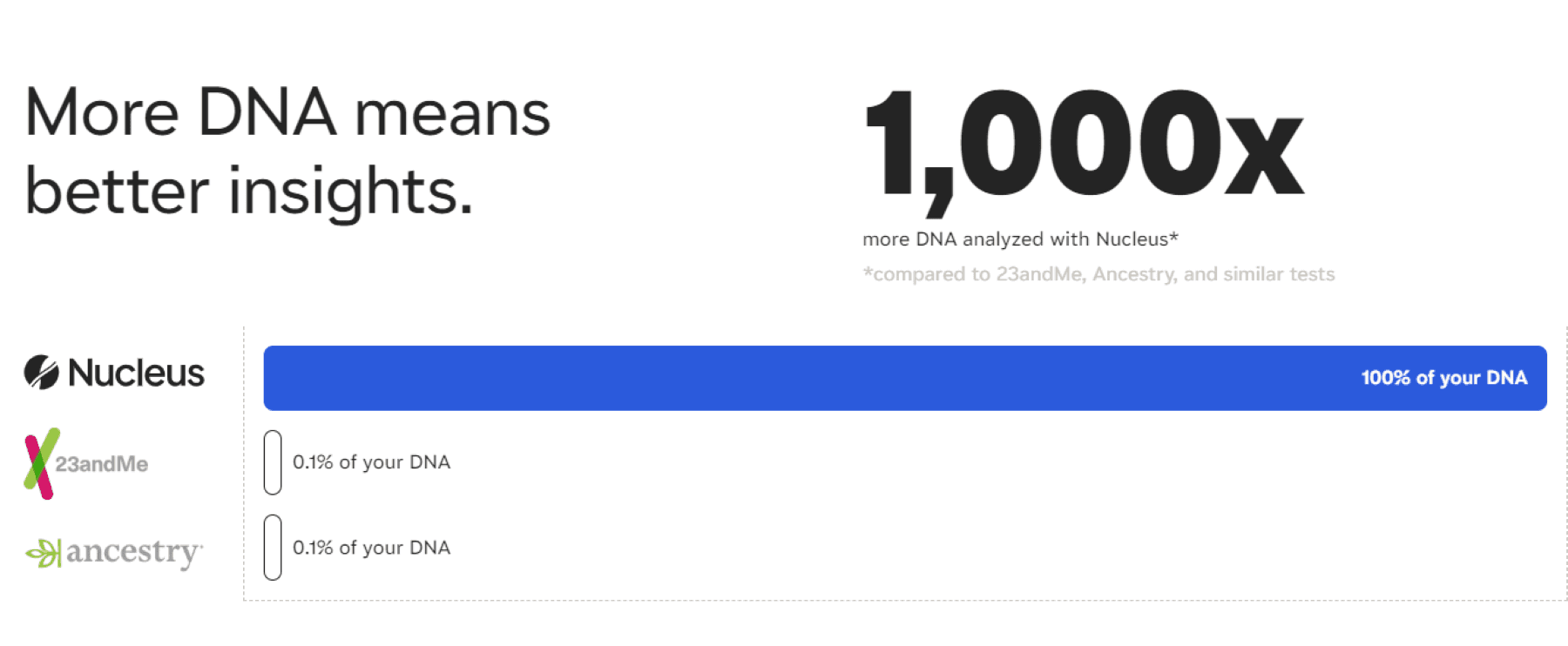
Nucleus Gives You Better Ownership of Your Health
DNA testing for tracing genealogy is fun, no doubt, but that’s not where the true power of this cutting-edge technology lies — it’s about making proactive health choices for you and your family.
Nucleus offers the most innovative DNA analyses focused on analyzing your entire genome for complete health screening — all clinical-grade and fully regulated CLIA-certified and CAP-accredited. You get more agency over your health and wellness decisions with the following:
Physician-approved whole-genome testing offering 99.9% accuracy
Easy-to-access at-home DNA kits
Comprehensive genetic screening for cancer, heart, and neurological conditions
Nucleus compares your DNA with similar data from your relevant ancestry, like European, African, South Asian, and East Asian, to identify your common genetic scores for typical health risks.
The platform also combines genetic data with your lifestyle factors like BMI and age to shape your reports. Receive tailored reports for:
Cancers, mental health conditions, heart disease, and more
Rare DNA differences that are powerful enough to cause diseases on their own (like Alzheimer’s or rare cancers)
Carrier screening for specific autosomal recessive diseases (coming soon!)
Genetic IQ and trait analysis (coming soon!)
Nucleus works with SteadyMD to give you access to genetic counselors who provide practical guidance on the detected concerns.
Easy-To-Use Kit + Fast Results!
With Nucleus, you only need to swab your cheeks for a cheek sample and send it back using the prepaid shipping label. You'll receive an email notification when your results are ready, typically within four weeks.
Nucleus is compliant with all industry-standard privacy and security laws, including HIPAA. The testing is done on U.S. machines, and the team destroys the biological samples within 60 days of being received by the lab.
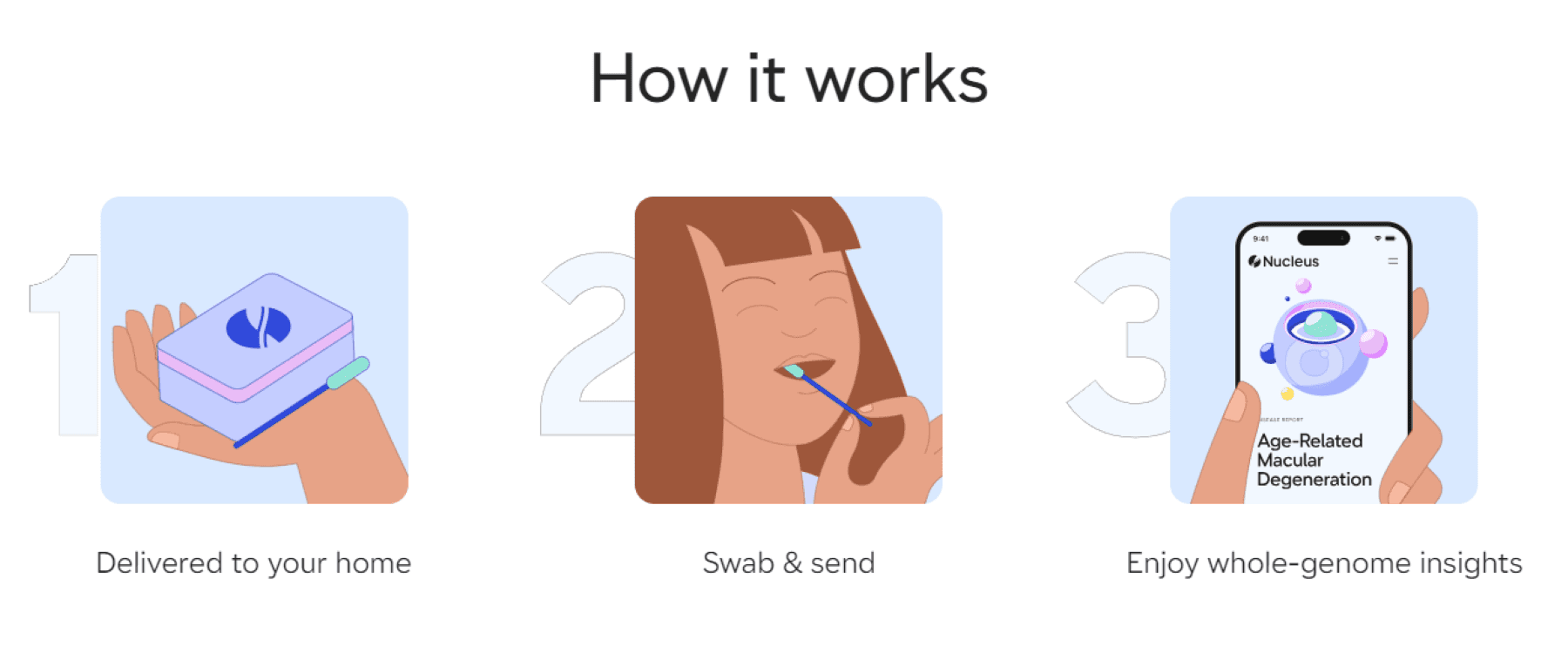
Invest in Your Future: Order a Nucleus All-in-One DNA Kit
Whole-genome DNA tests are typically expensive in the U.S., often costing over $3,000 for a complete health screening. With Nucleus Premium, you can access everything at a single price point of [PRICE.KIT_SOLO.ONE].
Here’s how you can order your all-in-one DNA kit:
Add your account details
Order the kit
While you wait for your kit, you can set up your health profile and result preferences. This all-in-one genetic test comes with a one-year membership, which gives you automatic test updates based on changes in lifestyle or newer genetic advancements — as well as additional analysis on different diseases or traits.
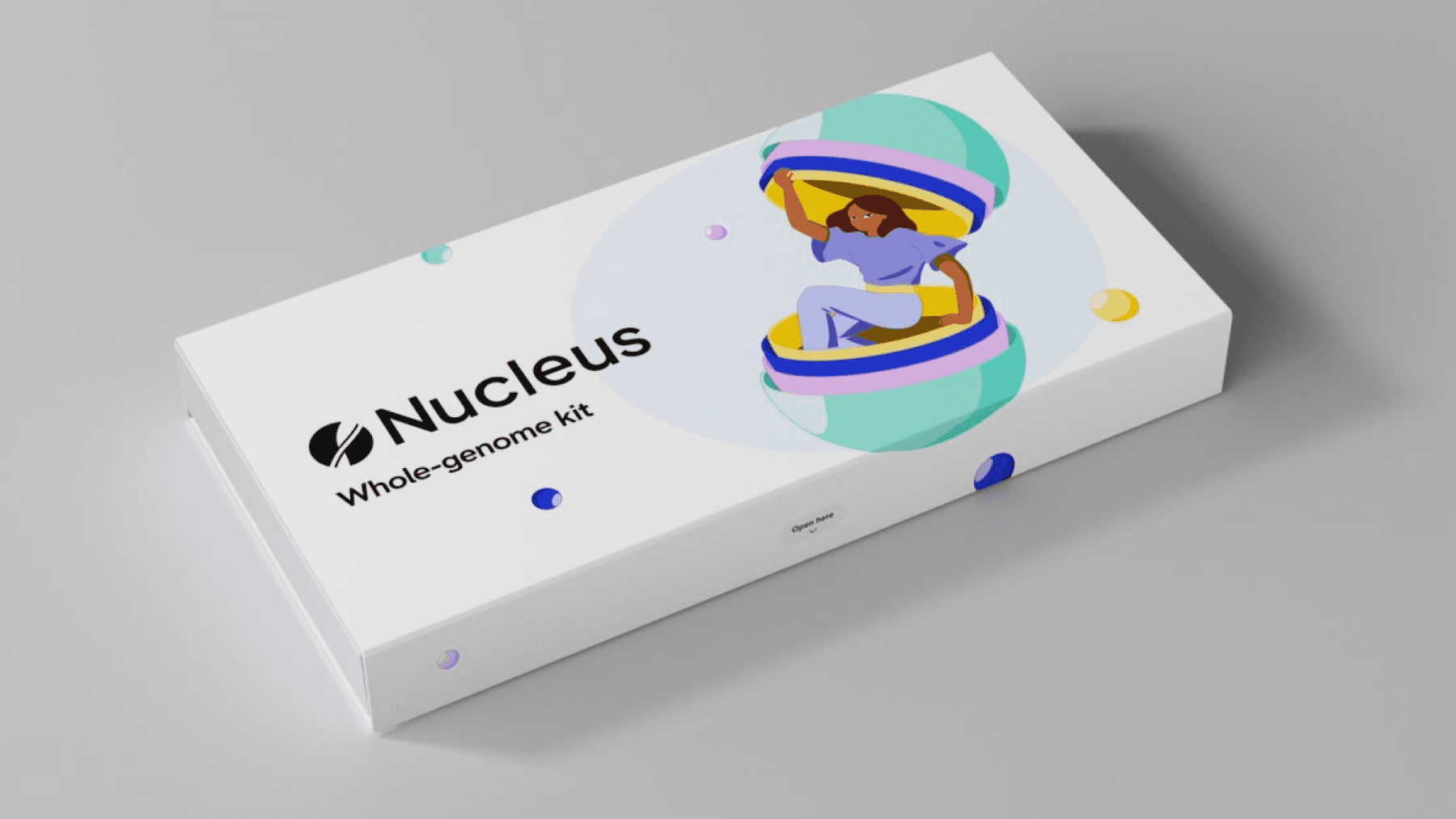
Source: @nucleusgenomics via X
Expand your knowledge of DNA testing services with these bonus reads:
Ancestry.com alternatives
Ancestry.com review
MyHeritage vs. AncestryDNA
23andMe alternatives
23andMe review
CRI Genetics vs. 23andMe












